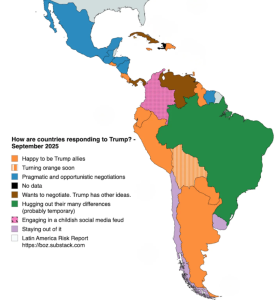A Book Review of Common Law Liberalism: A New Theory of the Libertarian Society, by John Hasnas.
Hasnas refers to inattentional blindness first to explain the success of the market failure argument. The concept is not controversial among economists, who would overwhelmingly agree that government intervention is necessary to correct the market’s failure to consider the social costs of private transactions. Economists, however, may simply be flirting with an idealistic model of what a market is, considering it as “the realm of unregulated voluntary contractions—the realm in which human beings interact free from any restraint other than self-interest.” Law, on the contrary, is assumed to be a set of norms conceived by the government to fix the problems arising from such interactions.
Both definitions are wrong. For one thing, the law is not exclusively legislation: that is, norms purposefully produced by lawmakers. Nor are those norms the ones that actually make for peaceful coexistence for most of our life. Some of the most important norms regulating our activities are still the outcome of the “old” common law—”rules that were abstracted from series of cases thought to represent just resolutions of past disputes.” Some are still based on custom and habit.
For another, the silhouette of a “realm of unregulated voluntary transactions is a theoretical construct with no referent in reality,” because human action is always regulated—by, Hasnas maintains, “ethics, custom, and the common law,” all of them being “emergent orders in which rules evolve as a result of human interaction but are not the output of any identifiable human will.” What economists simplify in the model of the free market is not a space free of regulations but only one in which the government has not stepped in yet.
Beliefs and customary practices, Hasnas argues, are themselves the outcome of trial-and-error attempts to reduce the degree to which individuals’ actions can cause harm to others. “Common law civil liability evolved to address the harmful actions that are not suppressed.” Economists seem to think civil liability is either absent or irrelevant. Most people may believe that legislation is necessary because civil liability would not disincentivize harmful action strongly enough. Yet, “the evidence suggests not that civil liability is a regulatory force but that it is too strong.” Hasnas’s case in point is a product liability suit, the infamous 1994 McDonald’s coffee cup case.
So goes the story: a 79 year-old woman who was a passenger in her grandson’s car goes through a McDonald’s drive-through. She orders a cup of coffee; her grandson stops the car so that she can add cream and sugar; in attempting to remove the lid of the cup, she accidentally spills the coffee on her lap. “This caused third-degree burns on her thighs, buttocks, and groin”.
McDonald’s corporate policy was then to hold coffee at between 180 and 190 degrees Fahrenheit. After the old lady was compensated with a total of $640,000 ($ 160,000 in compensatory damages and $ 2.7 million, reduced to $ 480,000, in punitive damages), “the McDonald’s she patronized began serving coffee at 158 degrees Fahrenheit” whereas “the McDonald’s handbook for franchisees ow calls for holding coffee between 170 and 180 degrees,” and, “Starbucks serves its coffee at between 150 and 170 degrees by corporate specification.”
The case, Hasnas explains, “became famous because it was thought to illustrate that the civil liability system provides too much safety regulation.” He does not mean to claim that the compensation was fair, or wasn’t—but to point out that civil liability offers an alternative to regulation. In writing on a more worrisome event, the BP 2010 oil spill in the Gulf of Mexico (of America?), Hasnas reminds us that regulation stepped in not to curb profit-seeking enterprises but rather because “common law civil liability discouraged drilling for oil at great depths,” making it necessary for the government to step in limiting oil companies’ liability.
“A free market economy had indeed been rejected by the 20th century. Yet wasn’t it at least centered on some rules, which by definition limited the discretion of rulers?”
After classical liberalism had been in retreat, both politically and intellectually, for the first half of the 20th century, we experienced a comeback of classical liberal ideas after World War II. For some, the rebirth of classical liberalism is best dated to 1947, when the Mont Pelerin Society was founded. Others would date it to the early 1960s, when works such as F.A. Hayek’s The Constitution of Liberty, Milton Friedman’s Capitalism and Freedom, and James Buchanan and Gordon Tullock‘s The Calculus of Consent were published. One thing is, however, clear. In those years, several theorists thought that the best way out of the authoritarian conundrum was to emphasize the rule of law as the essence of classical liberalism. This was also key to redeeming some respectability for the market economy. A free market economy had indeed been rejected by the 20th century. Yet wasn’t it at least centered on some rules, which by definition limited the discretion of rulers? Weren’t such rules better than the unchecked propensity to distribute privileges by an all-powerful bureaucracy?
Hasnas would caution us not to use “rules” indiscriminately. His book is reminiscent of Freedom and the Law published by Bruno Leoni in 1961. Leoni’s work developed out of his criticism of Hayek’s Cairo lectures, which later became part of The Constitution of Liberty. Leoni presented, among many, two key arguments for his friend. The first was not to confuse the British common law and the European Rechtsstaat, which were conducive to two very different forms of rule of law. The second one was not to mistake legal certainty for the mere fact laws were written. Written laws evoke certainty because written statutes can be read and hence known by all who are subject to them. But written laws, if they are the outcome of a legislative process, can be changed at will, and often are when a parliamentary majority changes. Plus, Hasnas’s only apparently extravagant political advice comes in handy: look around. How many people who actually read laws do you know? And if some wanted to, could they, as legislation multiplies week by week?
Hasnas distinguishes between “political” and “nonpolitical” law. Nonpolitical law is that in which rules “evolve without a guiding human intelligence.” That is, customary law and common law. Political law, on the other hand, is one in which a conscious human effort steers the norms in a particular direction.
Hasnas acknowledges that the dominant political culture, among social scientists as well as among ordinary people, is overwhelmingly in favor of political law. Should not law be purposeful; for example, shouldn’t it pursue the common good? And, perhaps more important, should not the law be grounded in some level of consent? Norms springing out of a political assembly reflect the consent that emerged in such an assembly, which, in turn, emerged out of some elections before.
But, again, look around. What are norms for? The theoreticians’ fascination for building a just society are at odds with political law as we know it in practice, as a system in which law-making is opportunistically used to the benefit of specific groups in society, no matter how grandiose the words which are used to justify it.
Norms may, more modestly, be devices to resolve conflicts in a smoother and less violent way. Going back to England after the collapse of the Roman Empire, where the conditions were such that they may be considered to resemble a state of nature, Hasnas points out how rules evolve to make peaceful coexistence possible. From the blood feud (“when someone was assaulted, killed, or otherwise wronged, the expected, socially accepted response was for the members of the aggrieved party’s household or clan to wage private war against the wrongdoer”), then we moved to a system of negotiations: “when both parties agreed, they could lay their dispute before the moot [a public assembly which served as the chief instrument of social administration], whose members, much like present-day mediators, attempted to facilitate an accommodation that both parties found acceptable.” As “such negotiated settlements avoided the strife and physical risk of the blood feud, community pressure gradually transformed the effort to reach them from an optional alternative to the feud to a necessary prerequisite for receiving the help of one’s grouped in protecting it.” Successful negotiations typically involved some form of compensatory payment and from that evolved a fixed schedule of penalties for various types of injuries. Thus, “by establishing a schedule of payments associated with various types of actions that damaged the interests of others, customary law established the obligations members of the community owed to their fellows.” In this perspective, rights (the counterparts for obligations) are “problems solved”: they embody a story of attempts to fine tune proper compensation for certain wrongdoings or stopovers.
F.A. Hayek, writes Hasnas, “famously compared the price mechanism to a system of telecommunications that enables human beings to coordinate their economic activities. Customary law is similarly a system of telecommunications that enables humans to coordinate their social interaction as to avoid violence and facilitate joint pursuits”.
But isn’t that law, regardless of how it was produced? Hasnas’s sober prose does not aim to convince the reader that customary law, or common law, would always perform better. There can be “legal failure”, in the sense that an acephalous legal system, with no planner nor direction, can indeed lack in producing certain norms the public, at some point, may think it needs. Yet what political legal systems do not produce are “what Hayek referred to as rules of just conduct—general rules of universal application that do not favor the interests of any particular group.” The mere fact of entrusting somebody with the task of writing (and abolishing and rewriting) norms makes for them being at the service of some groups in society instead of others.
For more on these topics, see
To many, that may be a necessary evil. There is no law without a legislator, at least no law that allows for peaceful coexistence in a complex society. But is that true? Answering in the negative, Hasnas calls our attention to early Medieval England, but also to Law Merchant and how international arbitration systems work today, and to the whole sets of actions and interactions that in our daily lives are regulated by norms that were not “legislated.” Indeed: look around.



























